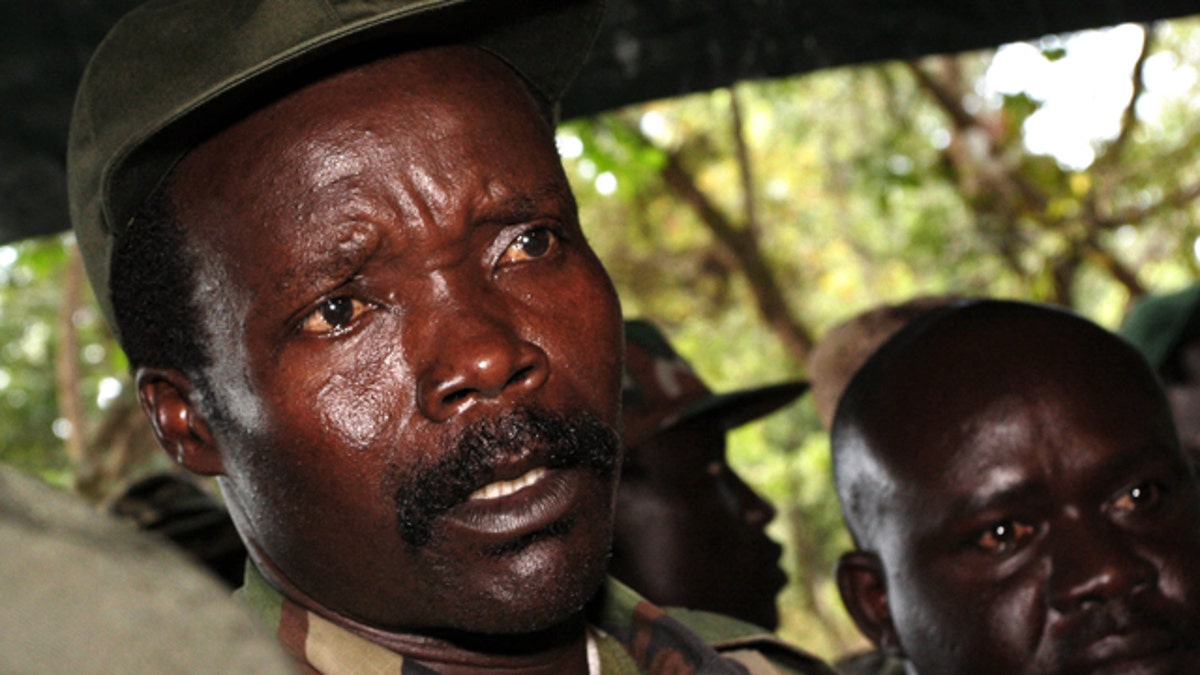
Joseph Kony, the elusive leader of the Lord's Resistance Army, believes himself to be the spokesman of God. (AP) (AP)
Aided by a viral video campaign and celebrity sponsorship, the push to capture African warlord Joseph Kony is gaining a fresh round of support on Capitol Hill and could lead to a new commitment of U.S. resources in central Africa.
Whether that commitment comes in the form of more boots on the ground, advisers, financial aid, equipment or some combination is unclear. The U.S. has devoted millions of dollars to help forces fighting Kony's Lord's Resistance Army, and last fall President Obama dispatched 100 U.S. troops.
Sen. Chris Coons, D-Del., the lead sponsor on a bipartisan resolution with big-time backers condemning Kony, left the door open to the possibility of more troops in an interview with FoxNews.com.
He made clear he's not expecting to call for a commitment of combat forces, but said "I'd have to consider it" if African forces requested more boots from the United States. "It'd depend on the scope and the mission and the cost," he said.
"I am going to continue to support the mission, and any reasonable request I'm likely to advocate for," Coons said.
The resolution sponsored by Coons, which has nearly 40 co-sponsors, expresses support for U.S. efforts to "strengthen the capabilities of regional military forces" deployed against the LRA and step up collaboration with those countries. The resolution is backed by influential lawmakers including Sens. Lindsey Graham, R-S.C.; Joseph Lieberman, I-Conn.; and James Inhofe, R-Okla.
The hunt for Kony got an injection of troops from the African Union last week, when the multinational group announced 5,000 soldiers would help in the campaign to remove Kony and his forces from the battlefield. It was the latest signal that the effort to track down Kony was increasingly drawing in international support.
Kony is known for his years-long campaign of havoc and bloodshed, involving the abduction of child soldiers and mutilation of civilians as an intimidation tactic. His forces have drifted among central African countries including Uganda and what is now South Sudan. While the "army" of the man wanted by the International Criminal Court is diminished, he attracted renewed attention with the release of the so-called Kony 2012 Internet video.
Coons said no matter what happens, the region stays in the lead. "This is an African problem that calls for an African-led solution," he said.
Coons noted that Congress has already allotted funding for the mission, and suggested that could be used for various forms of aid -- like satellite phones and other equipment -- while noting the current contingent of U.S. forces may be enough.
"We may very well be engaged in strengthening the logistical and communications and intelligence abilities of the multi-national force," Coons said. "Helicopters, airlift, communications equipment, both short-term and long-term. ... That's the sort of infrastructure that's going to be needed."
Steve McDonald, director of the Africa Program at the Woodrow Wilson International Center for Scholars, said it's more likely that the U.S. would commit equipment to the Kony hunt than more soldiers.
He also said he wouldn't be surprised if the U.S. helps put up bounty money.
Though he described the mission as achievable, he said resolving the tension in the region will take more than simply capturing Kony -- and warned that capturing Kony is not so simple in the vast expanse of central Africa.
"We know how long it took to get Usama bin Laden. With the best intelligence efforts, a huge investment ... and the strongest nation on earth," he said. "Tracking someone down there is very, very difficult. It can be done. It probably will be done eventually, but it could be very time-consuming."
McDonald said his only frustration with the renewed attention on Kony is that it took a viral video to get people on board -- though he noted Coons and other officials have been aware of the problem for some time.
"We should have been pushing this thing to some kind of fruition, some kind of public consciousness a lot earlier," he said.
A Coons aide said Senate lawmakers really are looking at ways to support the anti-Kony mission without allocating more money or sending more troops.
"It's largely support for the existing operations," the aide said.
The U.S. and international interest in a mission that spans Uganda, South Sudan, Congo, and the Central African Republican is not new, though it has been building.
Congress in 2010 passed a law, signed by Obama, that called for U.S. coordination with central African governments to battle the LRA and neutralize Kony. From there, Obama sent 100 combat-ready forces to the region. Congress also authorized the Pentagon to provide support for that mission.
The troops Obama sent last year were meant to act as advisers but not actually engage in fighting except for self-defense. An administration official at the time downplayed the idea that the troops could be drawn into combat.
Coons sounded confident that the focus on Kony would ultimately remove him as a threat.
"This is a mission that if we bear down and focus, I'm confident can be accomplished," he said.




